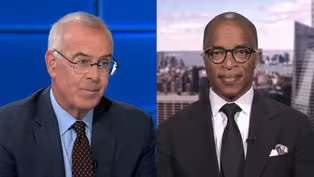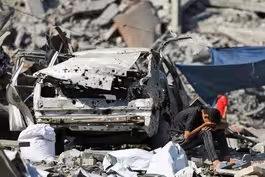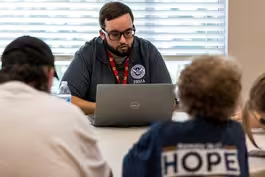
Gaza takeover won't end Hamas influence, Mideast expert says
Clip: 8/8/2025 | 5m 41sVideo has Closed Captions
Netanyahu's Gaza takeover won't end Hamas influence in the region, Mideast analyst says
For perspective on the Israeli government's decision to launch a military takeover in Gaza City, Geoff Bennett spoke with Aaron David Miller, a senior fellow at the Carnegie Endowment for International Peace and a former State Department official.
Problems playing video? | Closed Captioning Feedback
Problems playing video? | Closed Captioning Feedback
Major corporate funding for the PBS News Hour is provided by BDO, BNSF, Consumer Cellular, American Cruise Lines, and Raymond James. Funding for the PBS NewsHour Weekend is provided by...

Gaza takeover won't end Hamas influence, Mideast expert says
Clip: 8/8/2025 | 5m 41sVideo has Closed Captions
For perspective on the Israeli government's decision to launch a military takeover in Gaza City, Geoff Bennett spoke with Aaron David Miller, a senior fellow at the Carnegie Endowment for International Peace and a former State Department official.
Problems playing video? | Closed Captioning Feedback
How to Watch PBS News Hour
PBS News Hour is available to stream on pbs.org and the free PBS App, available on iPhone, Apple TV, Android TV, Android smartphones, Amazon Fire TV, Amazon Fire Tablet, Roku, Samsung Smart TV, and Vizio.
Providing Support for PBS.org
Learn Moreabout PBS online sponsorshipGEOFF BENNETT: For perspective, we turn now to Aaron David Miller.
He's a senior fellow at the Carnegie Endowment for International Peace and a former State Department official.
Welcome back to the program.
In your view, are the stated goals of this upcoming military operation, the gradual takeover of Gaza City, are they achievable?
AARON DAVID MILLER, Carnegie Endowment for International Peace: Look, I think they're as elusive as the prime minister's earlier conception of total victory.
The reality is, the Israelis have achieved a good deal.
They have hollowed out Hamas as a military organization.
They have got the Egyptians and the Qataris involved in trying to negotiate.
And let's be clear.
Of the 252 hostages that Hamas took amidst the willful and indiscriminate murder of men, women and children, the sexual predation, the mutilation and the taking of hostages, 100-plus have come back through negotiation.
So I think that, in the prime minister's conception, frankly, he's more interested in avenging the dead and keeping the war going than he is about redeeming the living.
So I think the answer to the question is no.
I don't think that a takeover or occupation - - Israelis don't want to use that word -- of Gaza City is going to somehow magically produce the victory of ending Hamas' influence in Gaza and somehow creating a post -- a day after that's conducive to the prime minister's goal.
He doesn't have a strategy and he hasn't been willing, not that it's easy, to lay out the elements of what you and I would describe as a sort of rational approach to try to end the war.
And we're two months away from a two - - marking a two-year period.
And the war strikes me as no closer to ending.
It's going to expand.
GEOFF BENNETT: And this plan calls for the forced evacuation of tens of thousands of Palestinians.
What do you see as the immediate and long-term consequences of that, the humanitarian consequences, on top of the famine that's already playing out?
AARON DAVID MILLER: Look, I think that part of the sort of unsaid objective here is not just to destroy Hamas as a military organization, but to hollow it out and deny it governing capacity.
It's still paying salaries.
It still has its probably Palestinian Authority paid officials basically on the ground.
And, look, the Israelis have, what, taken over 75 percent of Gaza.
The 25 percent that they have not taken over is the 25 percent where the vast majority of Palestinians are now living, in, what, anywhere from 12 to 20 percent of an already -- one of the most densely populated areas on the planet?
So I think the idea is to separate the fighters from the population, have a clear field to either lay siege to Gaza City and the Hamas elements inside, or to begin operating inside Gaza City proper and then expand to the central refugee camps.
And, look, let's be clear.
In May of 2024, the Israelis ended up one way or another moving almost 800,000 Palestinians out of Rafah before they began their military operations.
So can they move the population?
Yes, but at a frightful cost.
You pointed out the humanitarian issue here.
Whether it's malnutrition, starvation, food insecurity, large numbers of Palestinians are dying for lack of adequate food.
And once you get to malnutrition, you're talking about systemic illnesses that require access, predictable and regular access to medical care.
So no, I think that this plan won't work.
And we're going to find ourselves on October 7, which is the date that the Israelis are now using to complete the evacuation of Gaza City of civilians, we're going to find ourselves in an even more fraught and tragic position for the hostages, their families, and for the residents of Gaza.
GEOFF BENNETT: Meantime, you have got IDF leaders warning that expanding operations could stretch reservists.
It could add and create new burdens for governance.
In the minute we have left, what does that reveal about the internal dynamics within Israel's security establishment?
AARON DAVID MILLER: I mean, it's rare to have this kind of controversy between a prime minister and his chief of staff, Eyal Zamir, aired so publicly.
Should Zamir resign, I think the government would be faced with a political crisis.
He probably won't.
But I think it's a testament to the reality of the degree of difficulty that IDF faces in prosecuting a war where its adversary embeds its assets around, below and within civilian populations.
Last point, Sharon, Ariel Sharon, the builder of settlements in Sinai and in Gaza, in 2005, withdrew IDF forces, ended the Israeli occupation, as well as the 8,000 settlers in large part because he was concerned about the impact of those force -- the forces, in terms of their morale, their esprit de corps, as an active occupying power.
GEOFF BENNETT: Aaron David Miller, thanks again for your time.
We certainly appreciate your perspective.
AARON DAVID MILLER: Thanks for having me.
Brooks and Capehart on Israel's plans to control Gaza
Video has Closed Captions
Clip: 8/8/2025 | 10m 3s | Brooks and Capehart on Israel's plans to exert more control over Gaza (10m 3s)
How Trump's census plan could reshape congressional maps
Video has Closed Captions
Clip: 8/8/2025 | 4m 48s | How Trump's census plan could reshape congressional maps (4m 48s)
Israel decides to take Gaza City, sparking condemnation
Video has Closed Captions
Clip: 8/8/2025 | 4m | Israel's government decides to take Gaza City, sparking condemnation and protests (4m)
News Wrap: Thousands flee fire in mountains near LA
Video has Closed Captions
Clip: 8/8/2025 | 5m 56s | News Wrap: Thousands forced to flee Canyon Fire in mountains near LA (5m 56s)
Recent natural disasters highlight Trump's changes to FEMA
Video has Closed Captions
Clip: 8/8/2025 | 6m 31s | Federal response to recent disasters reveals impact of Trump's changes to FEMA (6m 31s)
Scientists face ecological, economic hurdles to save delta
Video has Closed Captions
Clip: 8/8/2025 | 8m 24s | Scientists face ecological and economic hurdles to save Mississippi River Delta (8m 24s)
Trump to meet with Putin for talks on ending Ukraine war
Video has Closed Captions
Clip: 8/8/2025 | 6m 38s | Trump will meet with Putin in Alaska for talks on ending Russia's war in Ukraine (6m 38s)
Providing Support for PBS.org
Learn Moreabout PBS online sponsorshipSupport for PBS provided by:
Major corporate funding for the PBS News Hour is provided by BDO, BNSF, Consumer Cellular, American Cruise Lines, and Raymond James. Funding for the PBS NewsHour Weekend is provided by...


















